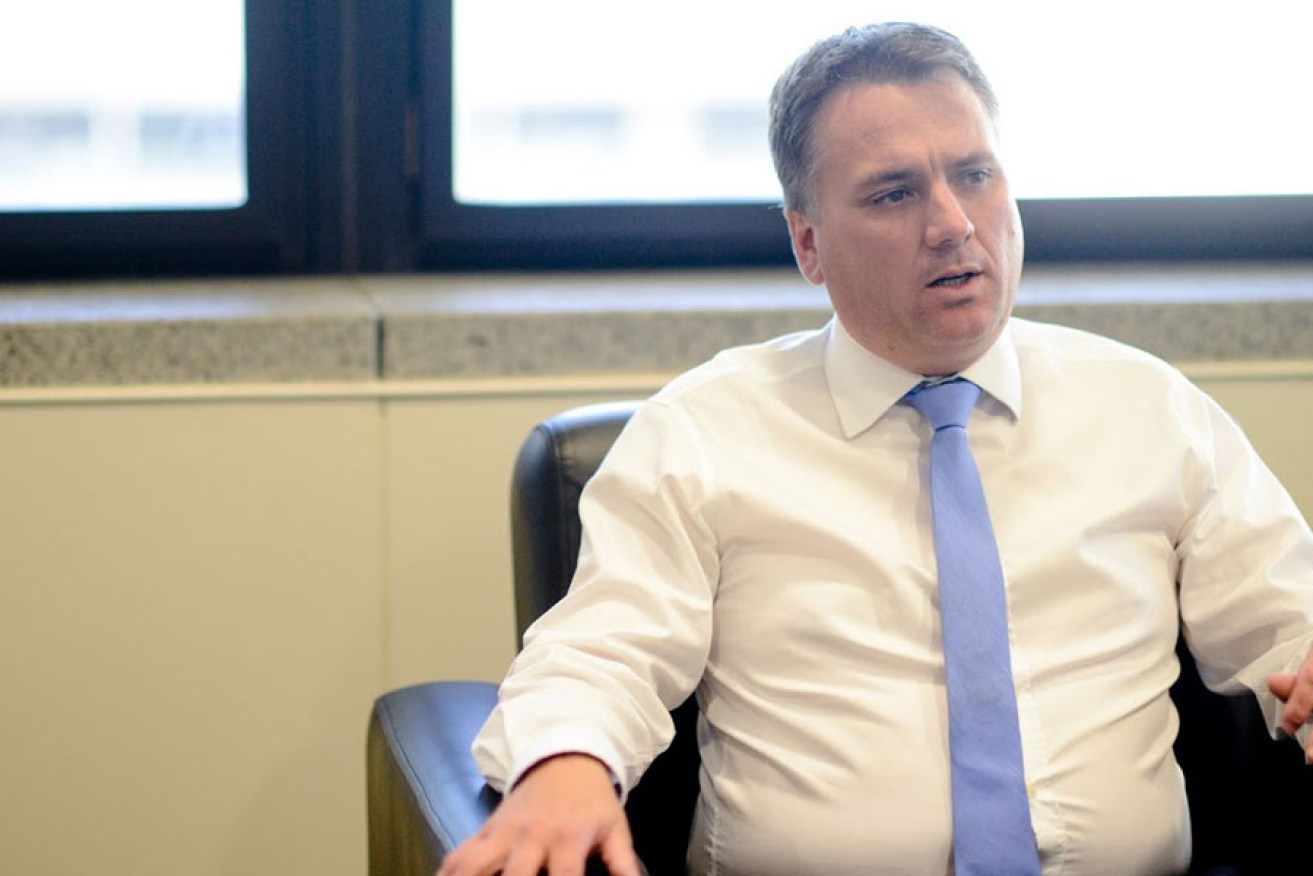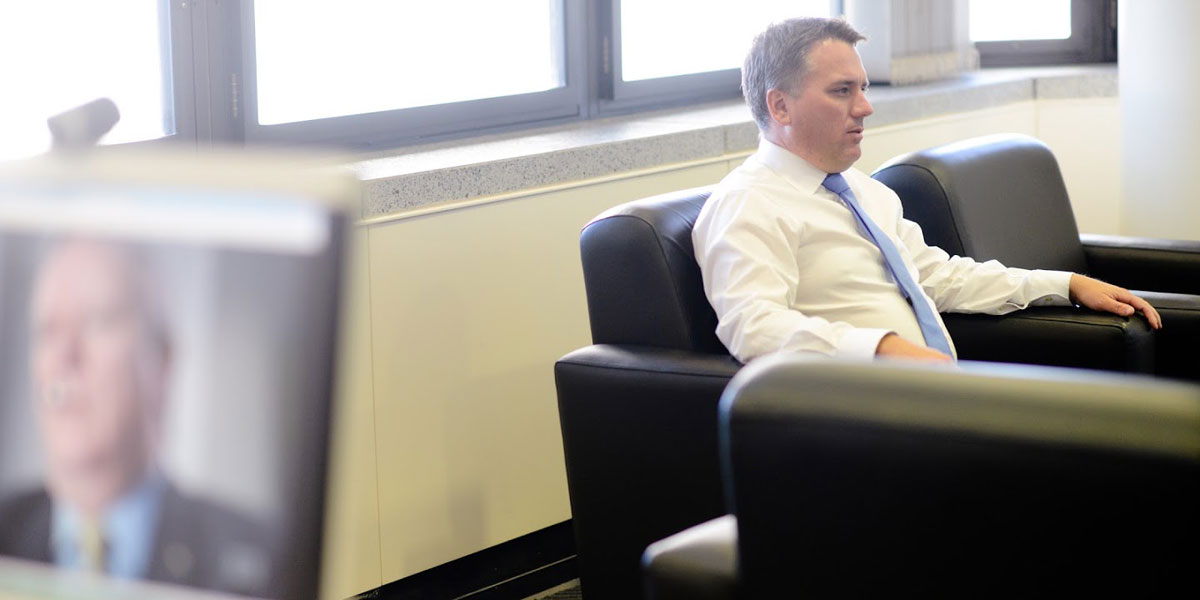The born-again urban futurist: “It’s time for sunshine”

Jamie Briggs: "I thought it was an odd position we took in Opposition to rule out one mode over other modes."
The Coalition minister who once called state Treasurer Tom Koutsantonis an “absolute lunatic” now says the Weatherill Government should “commended” for making Adelaide a “vibrant, engaging place to live”.
Jamie Briggs, who forged a reputation as an Abbott Government antagonist with the State Government in his home state of South Australia, is remaking himself as a cultural ambassador for Malcolm Turnbull’s emerging vision of metropolitan Australia, in the newly-created ministries of Cities and the Built Environment.
Some might say he is a born-again Urban Futurist.
“Well, it’s a futurist portfolio,” he says with a laugh.
“The PM kept saying that to me: it’s part of a 21st Century agenda … these are moving so quickly, to stand still now means to fall behind, so we do need to act.”
Under Abbott, the task fell to Briggs to bear the bad tidings to the states that funding for public transport infrastructure would not be forthcoming, with a spending agenda instead set on roads. In SA, this meant the on-again, off-again electrification of the Gawler rail-line was once again off.
But as a born-again Urban Futurist, Briggs is talking a different game, and insists he was doing so behind closed doors in the dying days of the Abbott era.
“I thought it was an odd position we took in Opposition to rule out one mode over other modes,” he reveals.
“I do agree with what Malcolm said, that we should be blind to the (transport) mode and making choices objectively.
“I think that’s an issue we got wrong, and I was in the midst of having discussions with the Prime Minister about how to move forward from that position we’d got ourselves into.”
“There’s a dark cloud hanging over Adelaide … it’s time for sunshine.”
He says now “we’d be kidding ourselves” to think cities can operate efficiently without first class metro systems.
“That was the same view two weeks ago, but our involvement in that arena wasn’t as strong as it will be in future,” he concedes.
“There’s no doubt public transport is vital to cities, particularly big cities, and the Commonwealth must play a role in facilitating that.”
While his ministry falls under the auspices of the Environment portfolio, he says it is very economic-focussed, emphasising that cities are a “key part” of the economy.
“A huge portion of our GDP is driven from our capital cities – 80 per cent of our jobs and 75 per cent of our population exist in capital cities,” he says.
Despite Australia’s fabled “wide brown land”, Briggs emphasises that “the majority of our population is locked up in our major cities”.
“Roads will still be an important part (of infrastructure spending) but there’s a mixture of infrastructure needs … and where the new PM has a different view on it is that public transport is obviously a vital element of that,” he says.
“I guess the other point is how do we finance the big public transport projects, because they’re very expensive, and they’re not commercially that attractive in the greenfield sense … so we need to be at the table for big new projects.
“Our task now is to work very hard with each state government about getting some plans in place.”
For Briggs, “the biggest challenge Australia faces in coming years is the battle for human capital”, striking a balance of attracting and retaining talent.
“You need cities where people want to live and work,” he says.
And already, he’s displaying a marked rhetorical shift from the Infrastructure Minister who took Koutsantonis to task in a radio stoush on ABC891 over pensioner concessions.
“The SA Premier actually has to be credited,” he says.
“He’s been big in this to the extent of making Adelaide a vibrant, cultural, attractive, engaging place to live.”
He cites the Adelaide Oval development and liquor licensing deregulation to encourage an influx of small bars.
“Adelaide has got a huge chance here,” he notes.
“As it gets more difficult to live in Sydney and Melbourne, this liveability aspect of it is a huge opportunity for a city like Adelaide to be that attractive place where people want to be, that happening, attractive, liveable city where people want to live and work and raise families … that’s the competitive advantage cities are going to need in the future.”
What it’s lacking, he argues, is confidence, an intangible element whose absence strikes him all the more as he travels the furthest reaches of the country.
“We’re the most down in the mouth state of them all at the moment,” he laments.
“There’s reasons for that; we’ve got challenges, there’s no question, but we’ve got to start talking more positively about what it is to be here instead of that consistent negativity we seem to get, possibly even since the State Bank broke.
“There’s a dark cloud hanging over Adelaide, it’s time for sunshine … we need to be upbeat and confident.”
“The State Opposition should be offering up well-thought-through alternatives as well…”
He notes the Weatherill Government’s work emphasising SA as a city-state, saying “they should be commended on that”.
“The Prime Minister is very big on confidence, he says it’s the most exciting time in history to be Australian and I think he’s right about that.”
But amidst all the goodwill and exhortations for confidence, to what extent has the constant political sniping, the accusations of lunacy, helped foster the cynicism?
“Well, we didn’t run advertising campaigns against ourselves, obviously,” he notes sardonically, referring to the SA Labor Government’s publicly-funded attack on the Commonwealth’s budget crackdown.
“The State Opposition should be critiquing the Government – that’s their job,” he says of his party colleagues.
But, he adds, they also “should be offering up well-thought-through alternatives as well, and that’s an important part of their job that I’m sure they’re putting effort into.”
Nonetheless, Briggs’ challenge is broader than picking or retreating from political stoushes.
“Heavy manufacturing is coming to a pretty significant end and we have to continue to think through what are our strengths and how do we play to them,” he says.
“I think we need to really engage with people: with the state governments, local governments, lord mayors and key stakeholders in the private sector … we’ll have disagreements, but you’d have to say there’s been far more agreement, far more outcome.”
More broadly, Briggs says housing affordability “is a broad government challenge that fits into this space”.
“Sometimes in Adelaide we don’t see just how significant an issue this has become in Sydney and Melbourne, getting access to reasonable priced housing close to where you work has become such a big challenge, and we do really need to work on how are we going to address this.”
It’s not merely a matter of addressing supply, but of improving connectivity. Briggs has just received correspondence from a man in Sydney who has a 90-minute commute to work each way, each day.
“That’s three hours of unproductive time,” he notes.
“The choices for people in cities like Melbourne and Sydney are getting less and less…each city has got different challenges, but the ultimate challenge is this battle for human capital.”
In meeting this challenge, though, he has high-level, enthusiastic support. One thing Briggs learned in his years working for John Howard and with Tony Abbott was how to pick when a Prime Minister is passionate about something. So far this week alone, he has had four lengthy discussions with Turnbull about his plans for cities and urban development.
“He’s very focussed in this area, and that’s a very good position to be in,” beams the new minister.
“A Prime Minister focused is a very important thing – Malcolm Turnbull focussed is just about an unstoppable force.”
Just ask Tony Abbott.





